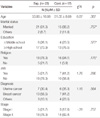Abstract
Purpose
This study was designed to examine the effects of horticultural therapy program on state-anxiety, fatigue and quality of life (QoL) of among women cancer survivors.
Methods
Quasi-experimental study was used with a nonequivalent control group pretest-posttest design. Data were collected from February to June, 2009. Participants consisted of 40 women cancer survivors in community. The experimental group participated in horticultural therapy program once a week for 18 weeks. Data were analyzed with SPSS/WIN 18.0 program using χ2-test and t-test.
Figures and Tables
References
1. Ministry of Health & Welfare. Annual report of cancer statistics in Korea in 2009. 2011. Seoul: Ministry of Health & Welfare.
2. Yang JH. The actual experiences of the living world among cancer patients. J Korean Acad Nurs. 2008. 38:140–151.

3. Morgan MA. Cancer survivorship: History, quality of life issues, and the evolving multidisciplinary approach to implementation of cancer survivorship care plans. Oncol Nurs Forum. 2009. 36:429–436.

4. Park MS, Kim KS. Cancer survivors' life experience. J Korean Oncol Nurs. 2008. 8:93–104.
5. Lee EH, Moon SM, Cho SY, Oh YT, Chun MS, Kim SH, et al. Psychometric evaluation of a need scale for cancer patients undergoing follow-up care. J Korean Acad Nurs. 2010. 40:551–560.

6. Lee BY, Jo HS, Kwon MS. Survey on quality of life, mental health and subjective health status of community dwelling cancer patients. J Korean Acad Public Health Nurs. 2010. 24:49–60.
7. Shin IS. The effects that influence the quality of life in cancer patients [dissertation]. 2005. Seoul: Kyung Hee Univ..
8. Hinz A, Krauss O, Hauss JP, Hockel M, Kortman RD, Stolzenbur JU, et al. Anxiety and depression in cancer patients compared with the general population. Eur J Cancer Care (Engl). 2010. 19:522–529.

9. Ziner KW, Sledge GW, Bell CJ, John S, Miller KD, Champion VL. Predicting fear of breast cancer recurrence and self-efficacy in survivors by age at diagnosis. Oncol Nurs Forum. 2012. 39:287–295.

10. Cho HS, Kim NH. Physical activity and fatigue in patients with cancer. J Korean Oncol Nurs. 2010. 10:30–37.
11. Oh BJ. Correlation between mental adjustment to cancer and anxiety. J Korean Oncol Nurs. 2009. 9:23–30.
12. Seo YM, Oh HS, Seo WS. Causal relationships among factors associated with cancer-related fatigue. European J Oncol Nurs. 2010. 14:380–386.

13. Oh PJ, Jung JA. A meta-analysis of intervention studies on cancer-related fatigue in Korea: 1990-2010. J Korean Clin Nurs Res. 2011. 17:163–175.
14. Han JS, Lee KS. Effects of the horticultural therapy on quality of life and depression in the institutionalized elderly. J Korean Acad Psychiatr Ment Health Nurs. 2002. 11:609–620.
15. Kim RB. Effect of horticultural Therapy on the quality of life of elopement women [dissertation]. 2002. Daegu: Catholic Univ..
16. Song MO. Development and effects of horticultural therapy nursing intervention program for hospice patients [dissertation]. 2009. Daegu: Keimyung Univ..
17. Kim HK, Lee HR, Song MO, Jung SH, Chung HJ. Effects of horticultural therapy program on serum cortisol, pain, anxiety and depression of the hospice patients. Korean J Hort Sci Technol. 2006. 24:95–103.
18. Choi MH. The therapeutic factors in horticultural therapy [dissertation]. 2010. Cheonan: Dankook Univ..
19. Cohen J. Statistical power analysis for the behavioral science. 1998. 2nd ed. Hiillsdale, NJ: Lawrence Erlbaum Associates.
20. Spielberger CD. Anxiety: state-trait process. Inc. Stress and Anxiety. 1975. New York: John Willy and Sons Inc.;115–143.
21. Kim JT, Shin DG. A study based on the standardization of the STAI for Korea. New Med J. 1978. 21:69–75.
22. Lee KJ, Song YS, Cho JK, Jun HK. Development of self-efficacy enhancing program to improve the quality of life for breast cancer patients. J Korean Acad Psychiatr Ment Health Nurs. 2007. 16:456–468.
23. Lee YA, Hwang HJ, Song JE, Son KC. Effect of horticultural therapy using pressed flower based upon logotherapy on the improvement of the purpose in life and ego identity of middle-aged women. Korean J Hort Sci Technol. 2007. 25:277–290.
24. Kim SH. Meta-analysis for the effectiveness of researches related to horticultural therapy [dissertation]. 2007. Seoul: Konkuk Univ..
25. Osborn RL, Demoncada AC, Feuerstein M. Psychosocial interventions for depression, anxiety, and quality of life in cancer survivors: meta-analyses. Int J Psychiatry Med. 2006. 36:13–34.

26. Shin AM, Park JS. The effects of hope intervention on hope and depression of cancer patients staying at home. J Korean Acad Nurs. 2007. 37:994–1002.

27. Han KH, Lee SM, Suh JK. Conceptual frame of group horticultural therapy model focused on reference review. J Korean Soc Plants People Environ. 2008. 11:53–64.
28. Song MJ, Kim MY, Sim IS, Kim WS. Evaluation of horticultual therapy on the emotional improvement of depressed patients by using heart rate variability. Korean J Hort Sci Technol. 2010. 28:1066–1071.
29. Kim HY, Lee HR. Effect of the five senses stimulating horticultual therapy on the mental social dysfunction of schizophrenic patients. J Korean Soc Plants People Environ. 2008. 11:41–47.




 PDF
PDF ePub
ePub Citation
Citation Print
Print






 XML Download
XML Download